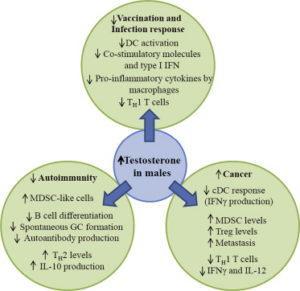
Regulation of immune responses by testosterone in males. Testosterone acts on various cell types involved in immune response to vaccinations and pathogenic infections, autoimmunity, and cancer. Testosterone has a suppressive effect on key cellular components responsible for mounting immune responses against different stimuli. Source: Trigunaite et al., Cellular Immunology 2018
Sex steroids are known to have great effects on the immune system. Females are known to induce stronger immune responses to vaccination than males. Furthermore, Studies have shown that the prevalence of autoimmune disorders such as rheumatoid arthritis and systemic lupus erythematosus are less prevalent in males compared to females. Androgen deficiency due to hypopituitarism or Klinefelter’s syndrome (males with two X chromosomes) has been associated with increased risk of lupus. Interestingly, clinical remission has been observed in individuals undergoing testosterone replacement therapy. Further suggesting a role of testosterone in immune modulation.
A study conducted in Stanford published in PNAS 2014, showed that men with low testosterone levels induced flu vaccine antibodies at similar levels as females and significantly higher than those observed in males with high testosterone levels. This suggests an immunomodulatory role of testosterone on B cell immunity. Additionally, males with Klinefelter’s syndrome have high B cell counts, which are lowered by testosterone replace therapy.
Studies have shown that testosterone and androgen receptor -receptor for testosterone- suppress splenic B cells in males. A study conducted by Wilhelmson et al., aimed to define the unknown mechanism by which testosterone regulated B cell numbers. BAFF cytokine is important for B cells survival, thus researchers hypothesised that testosterone negatively regulates BAFF. Indeed they showed using general androgen receptor (testosterone receptor) knock out mice and castrated mice, that testosterone downregulates BAFF in an androgen receptor dependent manner. This downregulation was dependent on the activity of adrenergic neurons (see results and methods for more detail).
In summary, this study demonstrates a novel regulation of BAFF by testosterone. It also highlights the need for further studies that determine if this mechanism plays a role in the sexual dimorphism of autoimmune diseases.
Journal Article: Wilhelmson et al., 2018. Testosterone is an endogenous regulator of BAFF and splenic B cell number. Nature Communications.
Article by Cheleka AM Mpande










